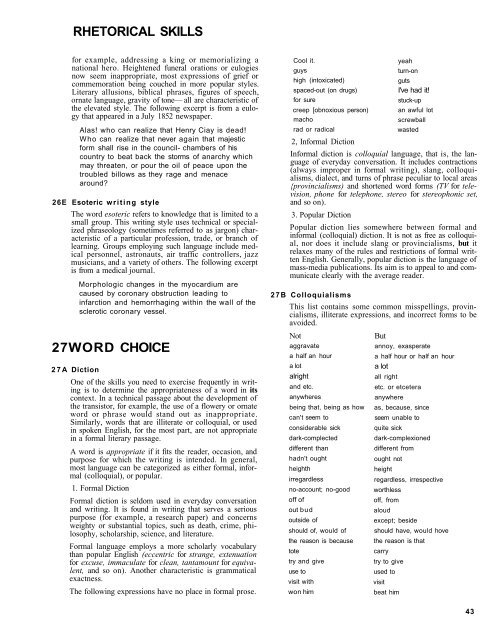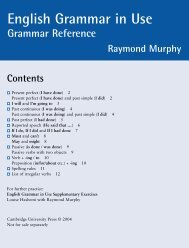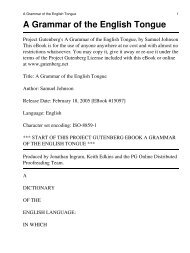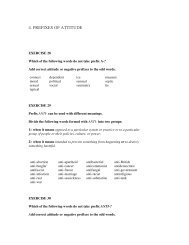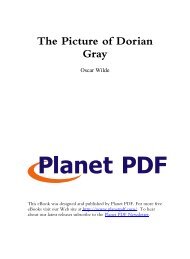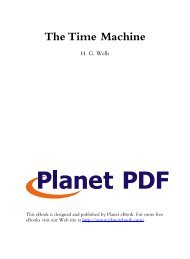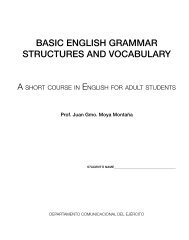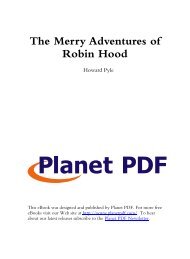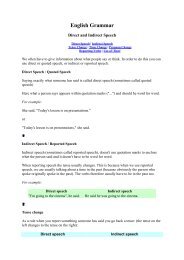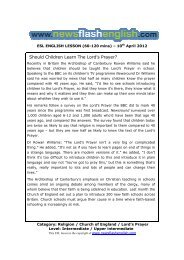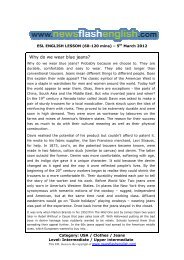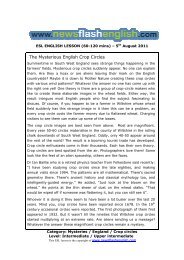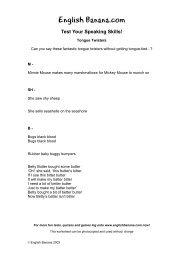RHE<strong>TO</strong>RICAL SKILLSity for the task or to create a question in the readers'minds that they need or hope to have answered—by continuingto read.The bnd that became the United States was incolonial times an extension of the Old World intothe New, Through the centuries, the descendantsof the original colonists blended their Europeanheritage into the new Nation that evolved. But forthe courage and resourcefulness of the Europeanswho first explored and settled the unknownwilderness, that evolution would not have beenpossible.The simplest closing paragraphs summarize the gist ofthe entire passage in a sentence or two. Others invite orchallenge the reader to engage in further research on thetopic. A good concluding paragraph will complete thepassage logically and clearly, leaving the reader with thecertainty that the main idea has been adequately developed.The amalgamation of such rich and diversenational, cultural, and racial elements into a freeand democratic society has created the UnitedStates of America—a blending of cultures,languages, and traditions that mirrors the hopesana aspirations of all mankind.26 STYLEA fundamental principle of writing is that style shouldremain consistent throughout any writing selection. Ifthere is an obvious shift in style, the selection immediatelybecomes awkward and not credible to the reader.There are several levels of formality in the prose thatmost students encounter: formal, informal, popular, elevated,and esoteric.26A Formal writing styleFormal style is characterized by long and complex sentences,a scholarly vocabulary, and a consistently serioustone. Grammatical rules are scrupulously observed, andthe subject matter is substantial. The selection mayinclude references to literai-y works or allusions to historicaland classical figures. Absent are contractions, colloquialexpressions, and an identified speaker, with theimpersonal one or the reader frequently used as the subject.The California coast, endowed with a wonderfulclimate and peopled by docile Indians, wasideally suited for the pastoral mission system bywhich New Spain had been slowly extending nernorthern frontiers. Elsewhere in the present UnitedStates the system had either failed or met with onlymoderate success; in California it thrived andreached perfection. Nevertheless, California wasthe last area in the United States to be penetratedby Spain—and not until the frontier lay virtuallydormant elsewhere. Located as it was so far out onthe lifelines of the Spanish Empire in the NewWorld, California was sparsely populated andneglected.Explorers and Settlers, Government Printing OfficeA formal writing style is used in serious essays, researchpapers, and legal documentation.26B Informal writing styleInformal style uses the language of everyday speech,characterized by contractions, colloquialisms, and occasionalslang. The topics are often light, and the approach,or tone, is conversational. Sentences are usually uncomplicated,and the writer makes no attempt to distancehimself from the reader, frequently using / or we as diesubject.Animals talk to each other, of course. There canbe no question about that; but i suppose there arevery few people who can understand them. I neverknew but one man who could. . This was JimBaker. According to Jim Baker, some animals haveonly a limited education, and use only very simplewords, and scarcely ever a comparison or aflowery figure; whereas, certain other animalshave a large vocabulary, a fine command oflanguage and a ready and fluent delivery;consequently these latter talk a great deal; theylike it; they are conscious of their talent, and theyenjoy "showing off."Mark Twain, A Tramp Abroad26C Popular writing styleThe popular style is the writing style most students use inschool work. Less colloquial and relaxed than the informal,the popular style consists of longer sentences, withno contractions but some colloquialisms when necessaryfor clarity and immediacy. Usually the tone of the workis serious, and the content is substantial and in<strong>format</strong>ive.The popular style is characteristic of the language used innewspapers, magazines, and contemporary literature.Look at the following student essay, written in popularstyle.Fishing has always been an art form to thepractitioner of the sport. The techniques involved inoutsmarting fish are passed down from generationto generation. Sometimes this in<strong>format</strong>ion isrelated in the form of direct instruction or throughthe use of illustrated books, but most neophyteslearn by watching others fish or by being asked to"mind my pole," That is usually the time when thebest fish or the day is caught. Such an occurrencecan and does drive expert anglers to distraction,causing them to mutter under their breath and castsidelong glances at a youngster who is doingeverything wrong but still manages to bring in awhopper.26D Elevated writing styleThe elevated style is poetic in tone and is intended forcertain solemn occasions that exist infrequently today—
RHE<strong>TO</strong>RICAL SKILLSfor example, addressing a king or memorializing anational hero. Heightened funeral orations or eulogiesnow seem inappropriate, most expressions of grief orcommemoration being couched in more popular styles.Literary allusions, biblical phrases, figures of speech,ornate language, gravity of tone— all are characteristic ofthe elevated style. The following excerpt is from a eulogythat appeared in a July 1852 newspaper.Alas! who can realize that Henry Ciay is dead!Who can realize that never again that majesticform shall rise in the council- chambers of hiscountry to beat back the storms of anarchy whichmay threaten, or pour the oil of peace upon thetroubled billows as they rage and menacearound?26E Esoteric writing styleThe word esoteric refers to knowledge that is limited to asmall group. This writing style uses technical or specializedphraseology (sometimes referred to as jargon) characteristicof a particular profession, trade, or branch oflearning. Groups employing such language include medicalpersonnel, astronauts, air traffic controllers, jazzmusicians, and a variety of others. The following excerptis from a medical journal.Morphologic changes in the myocardium arecaused by coronary obstruction leading toinfarction and hemorrhaging within the wall of thesclerotic coronary vessel.27WORD CHOICE27A DictionOne of the skills you need to exercise frequently in writingis to determine the appropriateness of a word in itscontext. In a technical passage about the development ofthe transistor, for example, the use of a flowery or ornateword or phrase would stand out as inappropriate.Similarly, words that are illiterate or colloquial, or usedin spoken English, for the most part, are not appropriatein a formal literary passage.A word is appropriate if it fits the reader, occasion, andpurpose for which the writing is intended. In general,most language can be categorized as either formal, informal(colloquial), or popular.1. Formal DictionFormal diction is seldom used in everyday conversationand writing. It is found in writing that serves a seriouspurpose (for example, a research paper) and concernsweighty or substantial topics, such as death, crime, philosophy,scholarship, science, and literature.Formal language employs a more scholarly vocabularythan popular English (eccentric for strange, extenuationfor excuse, immaculate for clean, tantamount for equivalent,and so on). Another characteristic is grammaticalexactness.The following expressions have no place in formal prose.Cool it.guyshigh (intoxicated)spaced-out (on drugs)for surecreep [obnoxious person)machorad or radical2, Informal Dictionyeahturn-ongutsI've had it!stuck-upan awful lotscrewballwastedInformal diction is colloquial language, that is, the languageof everyday conversation. It includes contractions(always improper in formal writing), slang, colloquialisms,dialect, and turns of phrase peculiar to local areas{provincialisms) and shortened word forms (TV for television,phone for telephone, stereo for stereophonic set,and so on).3. Popular DictionPopular diction lies somewhere between formal andinformal (colloquial) diction. It is not as free as colloquial,nor does it include slang or provincialisms, but itrelaxes many of the rules and restrictions of formal writtenEnglish. Generally, popular diction is the language ofmass-media publications. Its aim is to appeal to and communicateclearly with the average reader.27B ColloquialismsThis list contains some common misspellings, provincialisms,illiterate expressions, and incorrect forms to beavoided.Notaggravatea half an houra lotalrightand etc.anywheresbeing that, being as howcan't seem toconsiderable sickdark-complecteddifferent thanhadn't oughtheighthirregardlessno-account; no-goodoff ofout budoutside ofshould of, would ofthe reason is becausetotetry and giveuse tovisit withwon himButannoy, exasperatea half hour or half an houra lotall rightetc. or etceteraanywhereas, because, sinceseem unable toquite sickdark-complexioneddifferent fromought notheightregardless, irrespectiveworthlessoff, fromaloudexcept; besideshould have, would hovethe reason is thatcarrytry to giveused tovisitbeat him43


